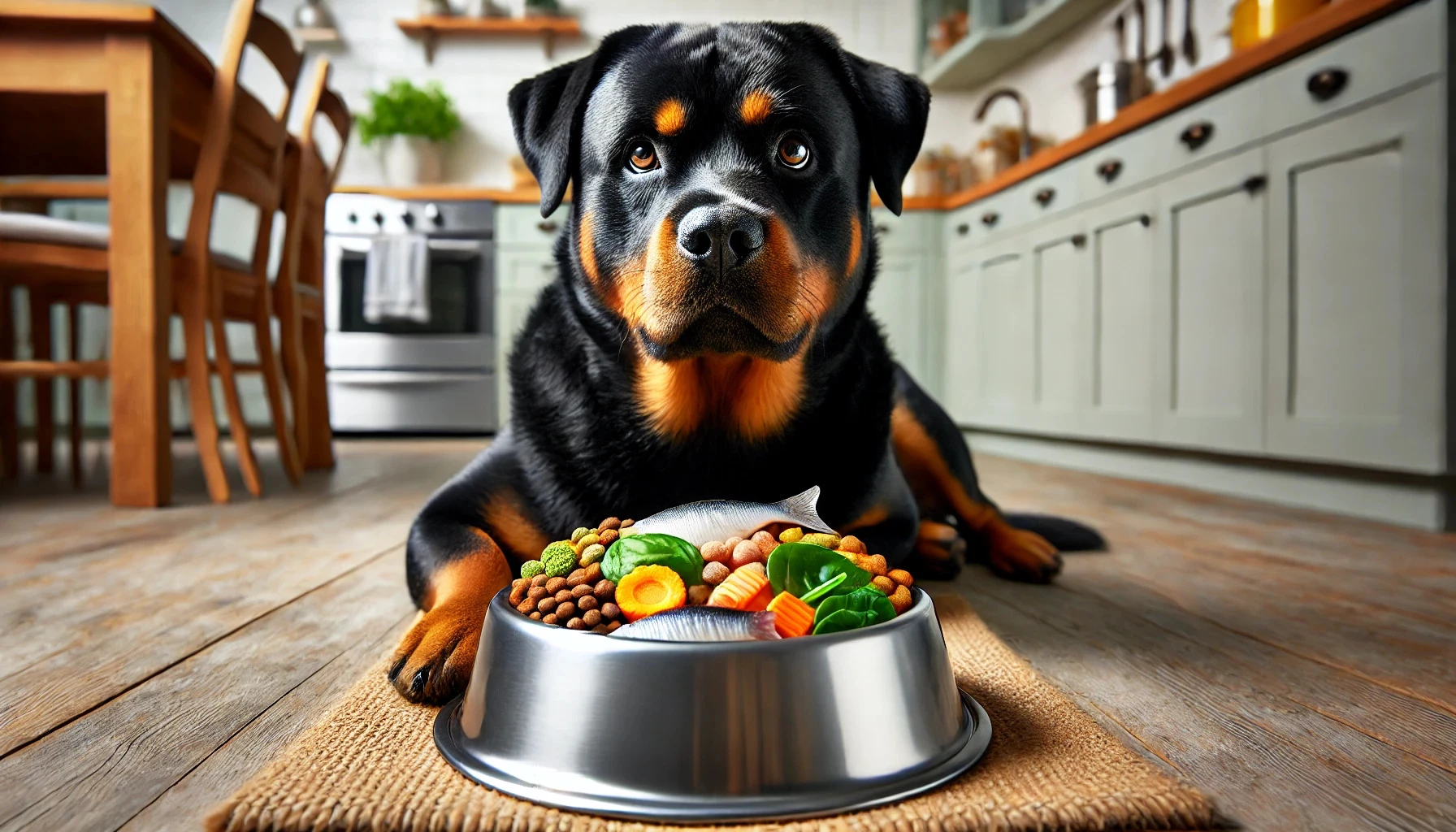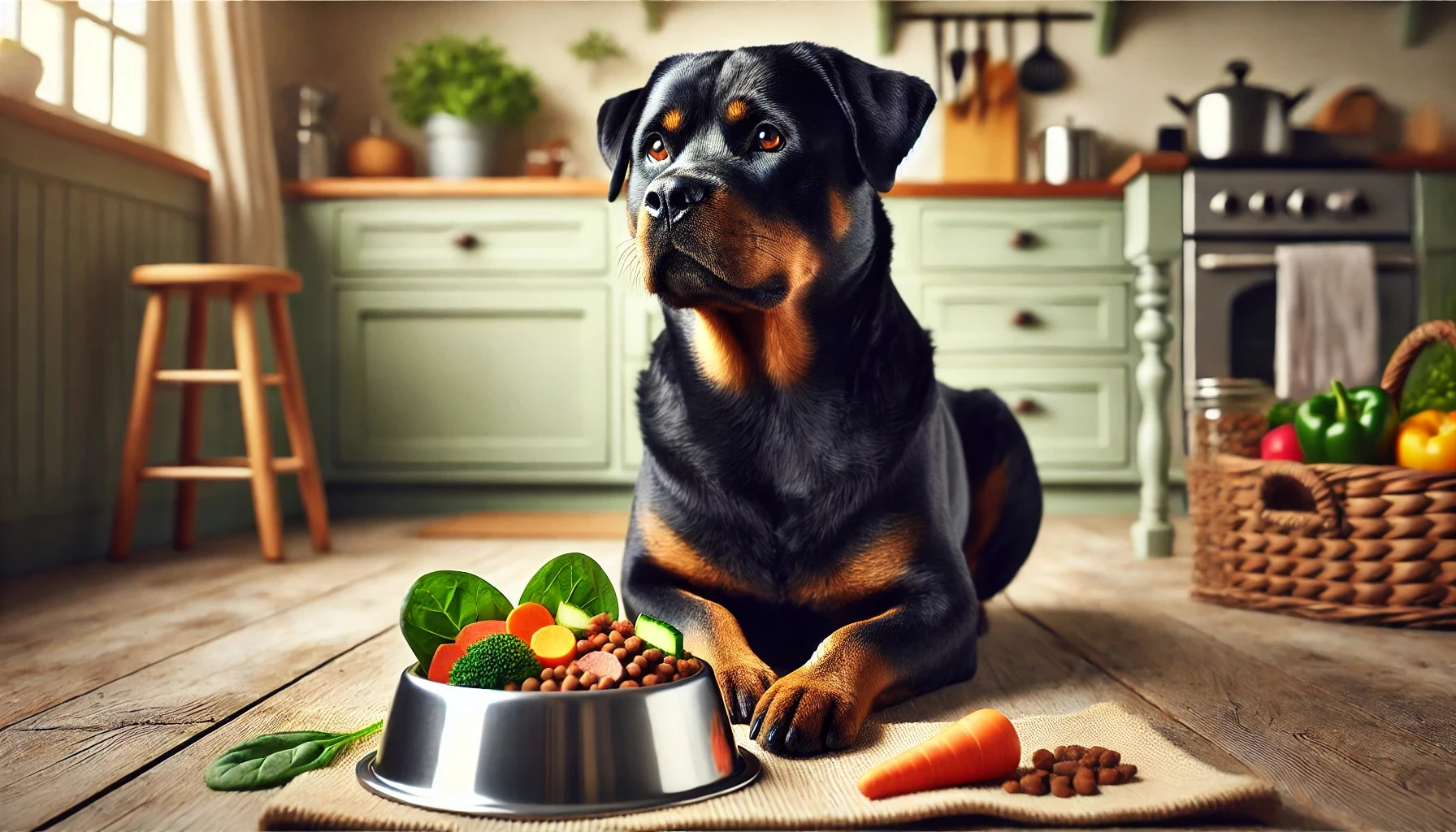On this page
Is diet crucial for maintaining a 9-year-old Rottweiler’s heart health?
Absolutely. At this age, Rottweilers enter their senior years, and their nutritional needs change significantly. Large breeds like Rottweilers are more prone to heart issues, such as dilated cardiomyopathy (DCM), making a heart-focused diet essential.
Senior Rottweilers require foods that are rich in omega-3 fatty acids, antioxidants, and low in sodium to support heart health. Compared to smaller breeds like Chihuahuas, Rottweilers have larger hearts that work harder, increasing the risk of heart-related conditions. Selecting the right food can improve your dog’s overall quality of life and reduce the chances of serious health issues.
In this article, we’ll explore the best dietary choices for a senior Rottweiler’s heart health, backed by expert veterinary advice.
Protect your Rottweiler’s heart health with Dosty App.
Are specific nutrients necessary to support a senior Rottweiler’s heart health?
Yes, certain nutrients play a critical role in maintaining cardiac function and overall well-being in your Rottweiler.
Key Nutrients for Heart Health:
Omega-3 Fatty Acids: Reduce inflammation and support heart muscle function.
Taurine and L-Carnitine: Essential amino acids that strengthen the heart.
Antioxidants: Vitamins C and E help combat oxidative stress.
Low Sodium Levels: Prevents water retention and reduces heart strain.
Dr. Amanda Clark, a veterinary nutritionist, explains, “A heart-healthy diet isn’t just about limiting bad ingredients like sodium but also adding beneficial nutrients like omega-3s.”

What specific foods can improve your Rottweiler’s heart health?
Several high-quality commercial dog foods and natural options are tailored to support senior Rottweiler dogs.
Recommended Foods:
Hill’s Science Diet Adult 7+ Heart Care: Formulated with taurine and L-carnitine for heart support.
Royal Canin Cardiac: Low sodium with added omega-3 fatty acids.
Natural Balance L.I.D. Sweet Potato & Fish: Grain-free with omega-3-rich fish.
Fresh Cooked Foods: Lean proteins like chicken or turkey, paired with steamed vegetables.
Dr. Sarah Bennett notes, “Combining a premium dog food with fresh, natural ingredients can provide your senior dog with a balanced, heart-healthy diet.”
Is a heart-healthy diet enough to prevent heart disease in Rottweilers?
It’s a critical factor, but prevention for your Rottweiler also involves regular exercise and vet check-ups.
Dietary Tips for Prevention:
Limit Sodium: Avoid table scraps or processed treats high in salt.
Use Supplements: Fish oil or omega-3 supplements can strengthen the heart.
Choose Whole Foods: Incorporate fresh fruits like blueberries for antioxidants.
Dr. Kevin Ross, a cardiac specialist, states, “Diet alone can’t eliminate all risks, but it plays a massive role in reducing the likelihood of heart disease in senior dogs.”
Do Rottweilers face a higher risk of heart problems compared to other dogs?
Yes, their size and genetics increase the likelihood of developing conditions like dilated cardiomyopathy (DCM).
Breed Comparisons:
Rottweilers: Prone to DCM and require a taurine-rich diet.
Golden Retrievers: Moderate risk of heart issues but benefit from omega-3s.
Pugs: Rarely experience heart conditions but require weight management.
Dr. Emily Carter explains, “Rottweilers’ larger body size and active nature mean their hearts work harder, making heart-focused care vital.”
Access breed-specific care tips for Rottweilers with Dosty App!

Should you change your Rottweiler’s diet all at once?
No, transitioning slowly is important to avoid upsetting their stomach.
Steps to Switch Diets Safely:
Mix New Food Gradually: Start with 25% new food and 75% old food.
Increase New Food Over 7-10 Days: Adjust to 100% new food gradually.
Monitor Response: Look for changes in stool consistency or appetite.
Dr. James Lee advises, “A slow transition minimizes digestive issues and helps your dog adjust to the new diet comfortably.”
Can diet help if your Rottweiler already shows signs of heart issues?
Yes, but early detection is essential for effective treatment in your Rottweiler.
Warning Signs of Heart Disease:
Persistent coughing, especially at night.
Rapid breathing or difficulty exercising.
Swelling in the abdomen or legs.
Lethargy or fainting spells.
According to Dr. Laura White, “Heart issues can often be managed with a combination of diet, medication, and regular veterinary care.”
For more tips visit our page Dosty.co.

Conclusion: Protect Your Rottweiler’s Heart With the Right Diet
Choosing the right food for a 9-year-old Rottweiler can significantly improve their heart health and overall quality of life. Focus on foods rich in omega-3s, taurine, and antioxidants, while avoiding high-sodium options. Regular vet visits and early intervention can further enhance your Rottweiler’s well-being.
Take the first step toward heart health. Download Dosty App for personalized diet and care tips for your Rottweiler.

